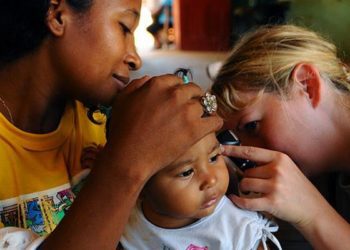Low risk of invasive bacterial infection in afebrile infants with acute otitis media
1. The prevalence of invasive bacterial infection in afebrile infants less than 90 days old with acute otitis media was uncommon.
2. Infants aged 0 to 28 days were more likely to undergo diagnostic testing and be admitted to the hospital.
Evidence Rating Level: 2 (Good)
Study Rundown: Acute otitis media (AOM) is relatively uncommon in infants less than 90 days old, and there is a paucity of published guidance in managing these patients. Because young infants are at increased risk of invasive bacterial infection (IBI), practices differ regarding whether a more extensive diagnostic work up is performed in young, afebrile infants with AOM. This study sought to determine the prevalence of IBIs events in this population to evaluate the utility of a comprehensive work-up. Researchers found that IBIs and adverse events were uncommon in these patients, and that young patient age was a strong compelling factor for many physicians to obtain further work-up. Despite this study’s inclusion of questionable physical exam findings to support AOM diagnosis, the data suggests that it is reasonable to rely on outpatient management of afebrile infants less than 90 days old with AOM without need for further diagnostic testing.
Click to read the study in Pediatrics
Click to read an accompanying editorial in Pediatrics
Relevant Reading: Otitis media in the first six weeks of life: diagnosis, bacteriology, and management
In-Depth [cross sectional study]: This study included 1637 afebrile infants with AOM seen at 33 pediatric emergency departments (ED) between January 2007 and December 2017. These infants were categorized into 3 age groups based on cutoffs used for risk-stratifying febrile infants for IBI; 0 to 28, 29 to 56, and 57 to 90 days. IBI testing in these infants was defined by the drawing of blood cultures or CSF studies to evaluate for bacteremia or meningitis. Adverse events were measured through a 30-day follow up period after ED discharge, and included complications associated with AOM including sepsis, mastoiditis, and death. 0 of 278 infants with blood cultures drawn had bacteremia (0%, 95%, CI: 0%-1.4%), and 0 of 102 infants with CSF studies had bacterial meningitis (0%, 95% CI: 0%-3.6%). Only 2 of the 645 infants with 30 day follow up experienced an adverse event (0.3%; 95% CI: 0.1%-1.1%). Infants in the older age groups were less likely to have blood cultures, CSF studies or be hospitalized as compared to infants 0 to 28 days old.
Image: PD
©2020 2 Minute Medicine, Inc. All rights reserved. No works may be reproduced without expressed written consent from 2 Minute Medicine, Inc. Inquire about licensing here. No article should be construed as medical advice and is not intended as such by the authors or by 2 Minute Medicine, Inc.







